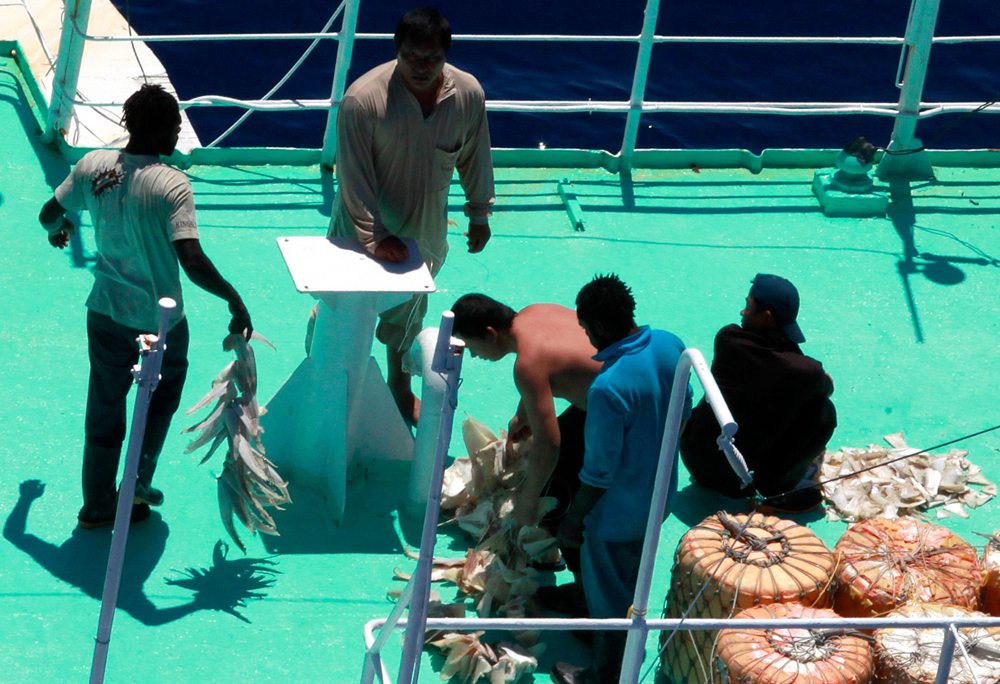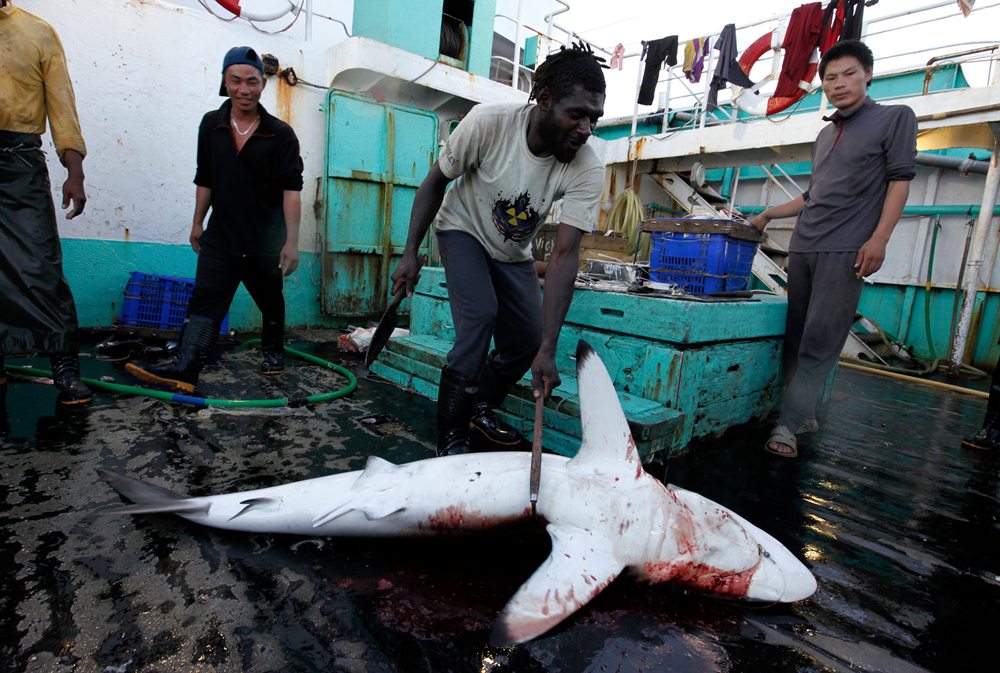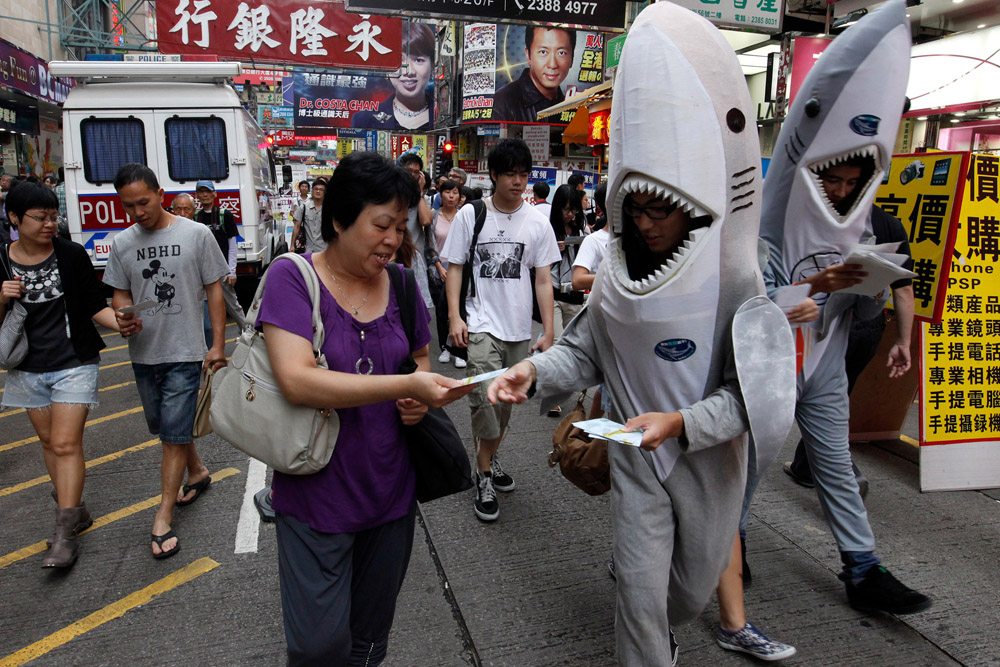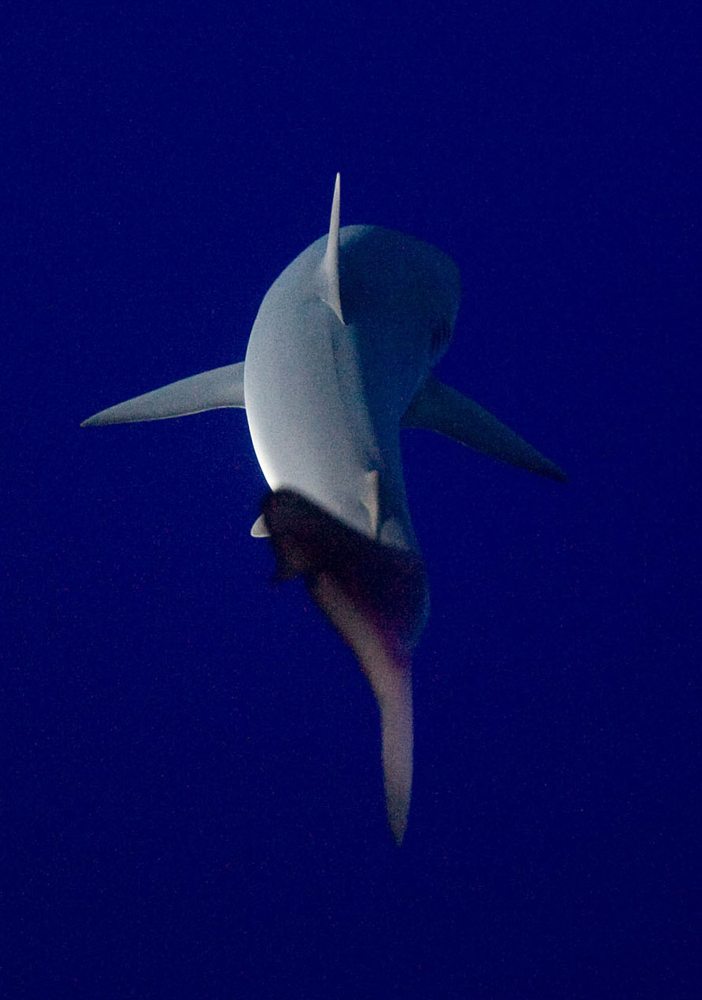Blogpost by Alex Hofford, photographer on board the MY Esperanza, Defending our Pacific ship tour 2011

@ Greenpeace / Alex Hofford Crew members of the 'Jing Lu Yuan No005' are seen hurriedly stuffing dried shark fins into bags and rushing below deck to remove them from view
Currently I’m on assignment for Greenpeace as the photographer on board the ‘MY Esperanza’ as part of the ‘Defending the Pacific‘ tour 2011. I arrived at the ship from my adopted home, Hong Kong, about two weeks ago, expecting the worst. Having done two previous ship tours in 2006 and 2009, I knew well that things can get dirty and bloody out here in the Pacific on a Greenpeace oceans campaign. And that’s not just the politics of the fishing industry. However nothing could prepare me for what I have seen this week.

© Greenpeace / Alex Hofford A shortfin mako shark is hacked to death on board the mainland Chinese longline fishing vessel 'Jing Lu Yuan No005'
On Monday, along with a group of activists from Greenpeace, I boarded a small Taiwanese long line fishing vessel, the ‘Ming Maan Shyang No20’ which was fishing in the international waters bordering Micronesia. The boat was ostensibly targeting tuna, but the total catch onboard had more sharks than tuna – 40 tuna, 41 sharks including the vulnerable oceanic white tip shark , as well as 22 swordfish, nine blue marlin and one striped marlin.
The oceanic white tip shark, according to the United Nations (UN) International Union for the Conservation of Nature (IUCN) ‘Red List of Threatened Species’ is listed as ‘vulnerable‘. It is incredible to think that 51% of their cold storage was being used up for so-called ‘bycatch’, with even threatened species listed in their catch logs.
Worker welfare was on my mind too, as the Philippine and Indonesian crew members were keen to show me their painful calloused hands, injured by handling industrial fishing gear with little protection. They also showed me their deformed toe-nails, damaged from endless weeks of wearing gum boots sloshing with sea water inside. It’s common practice for the fishing powers like Japan, South Korea and Taiwan to use impoverished labour from the poor countries of Asia and the the Pacific region. Their own citizens would never put up with the terrible working conditions endured by the workers that I have encountered this week from developing nations like Vietnam, Papua New Guinea, Indonesia, Philippines, and Vanuatu.
As seen through the prism of the global Occupy movement, it has been with this political dynamic in mind that I have seen how the rich fishing corporations of the distant water fishing nations represent the 1%, and how these workers earning pittance wages represent the 99%.
With that in mind I set off the next day to document a second long line fishing vessel, this time from China. It was the turn of the ‘Jin Lu Yuan No005’ to get an early morning surprise visit from Greenpeace, but this time it would be by helicopter. Upon arrival, I managed to photograph the crew hurriedly stuffing dried shark fins into bags and rushing below deck to remove them from our view. Something tells me they had a guilty conscience. Later that day I returned to the ‘Jin Lu Yuan No005’ to board it along with some Greenpeace activists. The captain denied all knowledge of our early morning encounter. Not only did he refuse to show me the bags of shark fin that he had removed from the roof earlier in the day, but he had the gall to counter that the crew had eaten it all for lunch. Incredulous, and knowing that I had encountered the brick wall that I know so well from other fisheries investigations in China, I spent the remaining time on board his vessel bearing witness to scenes of industrial brutality and butchery.
The high level of by catch associated with longline fishing is shocking. For this longliner, amongst the sting ray and mahimahi, what was disturbing in particular was the hauling in of a mature mako shark that had probably taken thirty or so years to reach adulthood. If Greenpeace had not been present on board, it would for sure have had it’s fin sliced off. But instead the Chinese captain made it clear over the PA system of the boat to the poor crew member from the small Pacific nation of Vanuatu that he should not slice off the fins off the shark whilst we were around. Instead the worker from Vanuatu was instructed to just cut off the shark’s head, slice it’s body open to extract the guts, then chuck it into the ship freezer.
All for what? A bowl of soup in Mainland China, Hong Kong or Taiwan?
At the root cause of shark finning lies greed, consumerism and the current, somewhat creaky, economic model of global capitalism.
For many Chinese that climb out of poverty into the middle class, a shark fin dinner for friends and family is de rigeur. And let’s not forget that shark fin was traditionally a dish reserved for the 1%. Or that as the scarcity of sharks fin increases, so does its price, and ironically, its desirability. I believe that the shark fin issue has become the ‘elephant in the room’ in the wider arena of fisheries issues in the Asia Pacific region, since it has become increasingly clear that longline fishing boats are now targeting sharks as well as tuna.
Of course there is no proof.
The industry is murky, catch logs can be fudged, and organized crime and corruption are never far away. But from anecdotal evidence gathered over the years it would certainly seem that sharks, are also a target species. Take for example the shocking photos seen on my fellow co-author and photographer Paul Hilton’s blog. Runaway seafood consumption patterns around the world, especially in Mainland China, are clearly out of control – and this is driving sharks to the brink of extinction. The other theory is that the boats are now targeting sharks as stocks of tuna have already been seriously depleted. It’s hard to say, but in all likelihood it is probably a combination of both factors.
This is why I have been trying to fuse in people’s minds the links between the current ‘Occupy’ movement of political protests that are sweeping the globe, and the environmental destruction that is going on daily in our oceans. At any given moment, somewhere in the Pacific ocean, thousands of purse seiners with highly destructive hi-tech fish aggregating devices, or FADs, are scooping out untold amounts of skipjack and yellowfin tuna to fill the daily sandwiches of the lunchtime office crowds in the West. And thousands of longline fishing vessels, operating with hundreds of thousands of miles of strong plastic lines and millions of hooks, are hunting twenty-four hours a day, 365 days a year in oceans around the world so that consumers in countless restaurants in Asia can dip bite size chunks of yellowfin and bigeye tuna into wasabi and soya sauce mixes.
So who profits from this greed? Certainly not the Pacific Islanders, the 99%, most of whom are steeped in poverty despite their various governments granting fishing licenses to the distant water fishing nations of Asia. Take Papua New Guinea as an example, where the Greenpeace ship which I am aboard has just come from. Its capital Port Moresby is famous for rampant poverty, car-jackings, rape, murder, muggings and very poor healthcare. Except for the exploited fishermen who work on board the boats and in its foreign-owned tuna canneries, the vast majority of the people of Papua New Guinea are not seeing the economic benefits of a foreign fishing industry running amok in its own territorial waters.
Its obvious to me that the root causes of the current crisis in our oceans are indeed the same root causes that the Occupy movement is protesting against. From Cairo to New York, Syria to Hong Kong, ordinary people are waking up politically to the awareness that global capitalism, corrupt politicians, corporate greed and environmental destruction are holding them back from a better life. So it is for the protesters outside the stock exchange in London, so it is for the voiceless tunas and sharks of the world’s oceans.

© Greenpeace / Alex Hofford 'Sharkette' activists from Hong Kong Shark Foundation handing out flyers in Hong Kong's busy Mong Kok district
I’ve been personally involved in shark conservation since 2006. First with the ‘Man & Shark‘ project and ongoing shark fin investigations in the region, then more recently with a newer NGO, the Hong Kong Shark Foundation. With some success for over five years now, we have been trying to stem the demand for shark fin in Hong Kong and China. It’s a tough gig, but we try to win over school kids, university students and the general public. We also target the Hong Kong and China governments, industry groups, chambers of commerce, hotels, restaurants and other NGOs to support us. With our books, our short films, indy band gigs, petitions, shark flash-mobs, shark freeze-mobs and shark plank-mobs, we try to win over the souls of Chinese everywhere. But what Greenpeace is doing in the Pacific is also of equal importance, because instead of targeting demand, the presence of Greenpeace in the Western and Central Pacific ocean is critical to ensure that the supply side does not collapse. No one is out here to monitor the environmental crimes being committed on a daily basis, in the huge expanses of blue desert that is the Pacific ocean. Only Greenpeace is doing that. Of the Pacific island nations that have a patrol boat, fuel is often an issue, as are the huge distances and other logistical problems.
Scientists have pointed to a tipping point for sharks, with population numbers of some species crashing below 90% in some cases. Greenpeace is not against fishing per se, but they are campaigning for the establishment of a network of marine reserves and an end to overfishing. And that means an end to unlicensed, unregulated and illegal fishing operations in the Pacific.
Sustainability is key, for it’s a fact that shark finning and shark fisheries are unsustainable. It’s a common fear in the scientific community that if we allow the oceans to be raped and pillaged at current rates, it is conceivable that the delicate balance of the oceans could be thrown out of kilter forever. This would have potentially devastating consequences for at least 20% of humanity that live in poor coastal areas, for whom fish is their main source of protein.
It all boils down to the choice between sustainability (99%) or corporate greed (1%).
My message to the world is ‘Let’s Occupy Oceans!’ @alexhofford #occupyoceans


